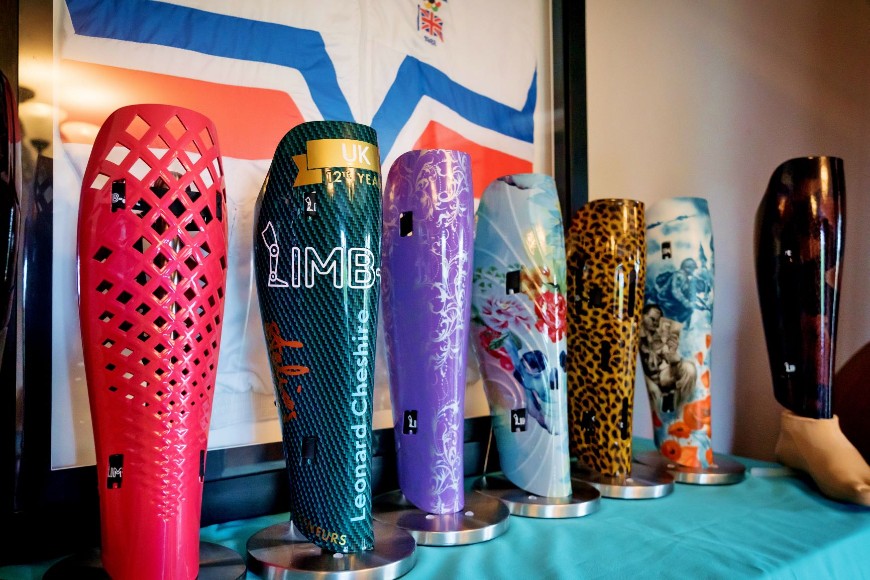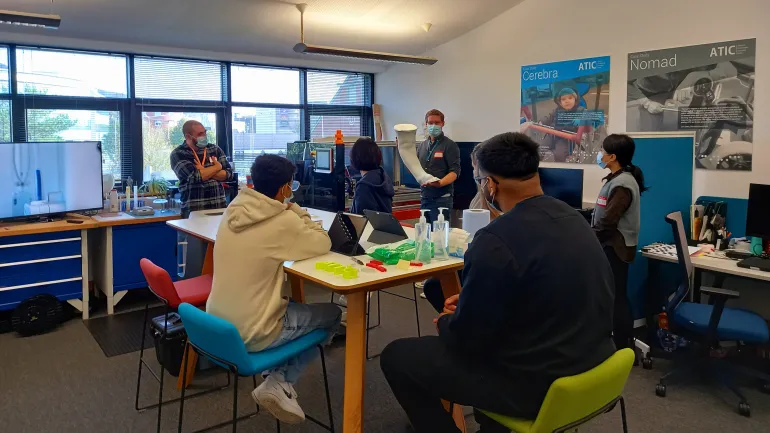A new research project is under way to explore the impact of prosthetic leg covers on the quality of life and wellbeing of amputees, and public attitudes towards them.

The three-month project is a collaboration between Conwy-based company LIMB-art Ltd, the University of Wales Trinity Saint David’s (UWTSD) Assistive Technologies Innovation Centre (ATiC), and the Psychological Evaluation and Research Consultancy Hub (PERCH) within UWTSD’s Centre for Psychology and Counselling.
It is supported by Life Sciences Hub Wales through Accelerate, a £24million co-funded programme by the European Regional Development Fund (ERDF) through the Welsh Government.
LIMB-art, located in Bylchau, was founded in 2018 by former Paralympic swimmer and medallist Mark Williams and his wife Rachel. The design and manufacturing company was established out of a desire to help other prosthetic users raise their confidence, be proud of what they have, and equally importantly, to have fun showing off their unique limb-art while doing so.
Mark Williams, CEO of LIMB-art said:
“Designed for all users of above and below knee prostheses, LIMB-art leg covers combine superior quality material and construction with cutting edge design and technology to provide robust, affordable – and above all, cool – leg covers”
While many disabilities may be transient or hidden, limb amputation is a profound form of disability that impacts upon almost every aspect of a person’s life, physically and psychologically.
Major limb amputations are carried out upon thousands of people within the UK every year for a variety of reasons; vascular disease, cancer, serious trauma and, particularly in the case of lower limb amputation, complications resulting from diabetes.
While physical challenges, such as dealing with mobility and balance issues, pain, and discomfort, can be addressed by hospital services such as physiotherapists and other health professionals, the psychological challenges may be equally as profound yet potentially harder to address.
Dr Paul Hutchings, Associate Professor of Psychology, PERCH, said:
“Research into the psychological impacts of limb amputation have tended to focus on the prevalence of depression and anxiety, with much of the research suggesting that depression is a major factor in the first two years post-amputation, with improving mental health outcomes beyond this time.
However, for a significant number of amputees there is evidence that body image anxiety linked to social discomfort may impact upon their levels of anxiety and depression and upon their social functioning. In short, concern about how they look to others and how they may be perceived can impair social interactions and impact upon the psychological well-being of the amputee.”

Dr Ceri Phelps, Health Psychologist and Academic Director of Psychology and Counselling at UWTSD, said:
“Despite advances in the technical design of prosthetic limbs over the last decade, the aesthetic appearance can still lead to an obvious noticeable visible difference which can bring with it recognised social anxiety concerns, stigma, and potential self-esteem issues.
It is of interest, therefore, to explore the extent to which the use of artistically designed prosthetic leg covers, designed to attract rather than divert attention, can either increase or decrease these psychological sequelae.”
The project will seek to examine the attitudes of the amputee and public towards use of a bespoke, artistically designed prosthetic limb cover and the potential psychosocial benefits and harms of wearing the product.
The study is exploratory in nature given the highly complex personal, situational, and contextual variables that need to be considered, and will provide important insight into the potential for such a product to improve quality of life and reduce stigma for amputees.
Dr Sean Jenkins, Associate Professor and ATiC Principal Research Fellow, said:
“We are delighted to work with LIMB-art on this exciting project, which brings together enterprise and academia through the Accelerate Wales programme and draws on the expertise and state-of-the-art facilities within two of UWTSD’s research centres.
ATiC will provide screen-based eye tracking and its facial expression recognition and analysis facilities, along with image/video capture and manipulation capabilities, and will be working in collaboration on the experimental design with our colleagues in PERCH who bring their extensive expertise in psychology and the psychosocial aspects of the study.”
Mark Williams added:
“After experiencing the awkward stares from the public to my leg and how insecure it made me feel, I am looking forward to working with UWTSD on this project to find out how the research outcomes will help the company develop and innovate – and more importantly really understand the difference our covers make to our customers.”
For further information visit https://limb-art.com/.




